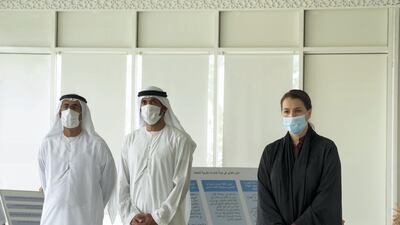Sheikh Mohammed bin Rashid, Prime Minister and Vice President of the UAE, reshuffled the Cabinet and merged ministries this week as a way to deliver a more nimble Government that is more able to make quick decisions to manage the country's post-pandemic future.
Earlier this year he said that the nation sought to develop a plan to ensure a fast recovery from restriction of movement orders, which were put in place to control the spread of coronavirus. This week that proposition began to emerge.
"Constant changes will remain the slogan of the coming period until we reach the best government model that keeps up in this new era and achieves the aspirations of the Emirati people," he said, while setting the new Government a deadline of a year to meet its targets.
The reshuffle builds out an ever more collaborative form of government. One minister described the approach as a unified house that was flexible enough for officials to move portfolios with the ease of stepping from one room to another within that structure. Another official said the reshuffle and reorganisation would engineer deeper co-operation between departments.
Sheikh Mohamed bin Zayed, Crown Prince of Abu Dhabi and Deputy Supreme Commander of the Armed Forces, visited some of the emirate's farms this week to view the methods they were using to increase food production and enhance food security.
His comments during the visit provided insight into the balance between the past and future that the UAE so often weighs, shifting what some might have seen as a prosaic factory visit into a statement about the present framed with rich historical reference.
“Supporting the agriculture sector is consistent with the UAE’s strategy for sustainability, environmental protection and preserving natural resources,” he said. “The late Sheikh Zayed attached great importance to agriculture. He was a visionary and always believed that agriculture is the backbone of any society. Sheikh Khalifa has continued that approach.”
Taken together the two acts present a snapshot of how the UAE views its past, and how it engages with the world today and plans for tomorrow.
Sheikh Mohamed bin Zayed's comments referenced the Founding Father's interest in and advocacy for agricultural land as a path towards economic development. They also speak to dearly held themes of resilience, sustainability and of the need to build and develop infrastructure. Sheikh Khalifa made similar pronouncements on Tuesday, issuing a law to safeguard Abu Dhabi's natural resources.
The Crown Prince’s farm visit also further underscored the country’s long-standing commitment to finding new and innovative solutions to old-world problems, such as securing a stable supply of food.
Sheikh Mohammed bin Rashid made similar trips to a fish farm and to a coffee production centre last month to observe other projects. Government officials have also recently praised the ability of food factories to keep up with demand during the pandemic.
We can also see that balance between history and the future in the Cabinet and ministries reorganisation.
So much of the UAE's foundation story is represented by great challenges being overcome through courage, clarity of thought and unity. The reshuffle gives that idea a contemporary twist.

The "one house" reference by Abdulla Al Nuaimi, the new Minister of Climate Change and Environment, speaks to a unified and nimble approach to 21st-century Government, as well as the historic union of seven emirates under one flag almost 50 years ago.
Noura Al Kaabi, the Minister of Culture and Youth, further noted that: “Since Covid-19 hit there has been more clarity in terms of what we do. It has shifted to a different kind of gear that focuses on how we can work more together as a federal system. There is more of a clear mandate.”
That is an interesting point of reference. The country’s coronavirus strategy has been delivered with a mixture of head, hand and heart: the first in the form of the widespread commitment to testing, the second through aid shipments overseas and the third in the willingness for officials and frontline workers to go out into communities to make sure the most vulnerable residents and citizens are looked after.
This approach has also settled for the longer term in a pronouncement that medicine, education and trade can and will change rapidly over the next few years. Sheikh Mohammed bin Rashid said the country “aims to be at the forefront of these changes”.
Future generations will note that the UAE's pandemic response was also grounded in the same philosophies that brought the country together, but that it also harnessed technology to overcome hurdles.
That same spirit of collaboration and collective will can also be seen in the series of community and business initiatives Abu Dhabi has introduced over the past year under the umbrella term of Ghadan 21, which both honours the historical ideals of coexistence and tolerance and sets a course for transformation to create tomorrow's city today.
Running through the core of these examples is a sense that history is a platform to view the world from rather than as a beacon or a burden. There is also a clear correlation between the country’s core values and the need to adapt and change to address the most dynamic circumstances.
Next week, the country will make history, weather permitting, when its Hope probe begins its mission to Mars. In a sense its journey to date and its expedition to come epitomises the country's story: cool heads and steady hands have brought it into being. Its beating heart will carry it forward to the Red Planet.
Nick March is an assistant editor-in-chief at The National






























